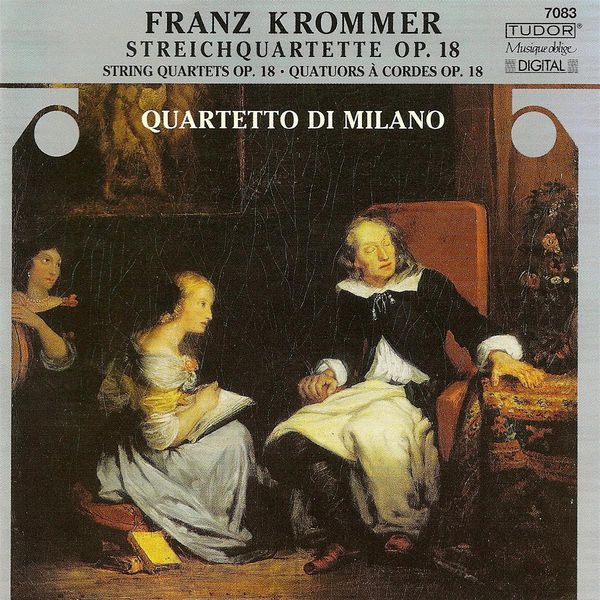
Musik-Streaming
Hören Sie dieses Album mit unseren Apps in hoher Audio-Qualität
Testen Sie Qobuz kostenlos und hören Sie sich das Album anHören Sie dieses Album im Rahmen Ihres Streaming-Abonnements mit den Qobuz-Apps
Abonnement abschließenHören Sie dieses Album im Rahmen Ihres Streaming-Abonnements mit den Qobuz-Apps
Download
Kaufen Sie dieses Album und laden Sie es in verschiedenen Formaten herunter, je nach Ihren Bedürfnissen.
Text in englischer Sprache verfügbar
Viennese composer Franz Krommer was born in Bohemia and also used his birth name, Frantisek Kramar. He was younger than Haydn but slightly older than Beethoven, who at first regarded him as potential competition in the string quartet genre but then stopped worrying. That was because there is little expression in quartets like these; as Quartetto di Milano member Thomas Wicky-Borner put it in his notes, Krommer "hardly ever reveals himself to us in his compositions." Written in the late 1790s, these works belong with the Classical era and not the Romantic, and in the minuet form, where Haydn had said everything that could be said, they are not very interesting. That said, Krommer did absorb one major aspect of Beethoven's string quartet language: like Beethoven's, these are not quartets for amateurs. The first-violin parts require a serious player, and these three quartets in general abound with flashy contrasts in texture and in passages that are big without being quasi-orchestral. The last movement of the String Quartet in D major, Op. 18/1, is an example of a movement that follows Haydn's formal designs but gooses them with fancy fingerwork. The outer movements of all three of these quartets are exciting for the listener, with a vigor that sets them apart from Hummel's expansive structure, and they pose challenges to the players that the Quartetto di Milano surmounts for the most part. Sometimes the group lays on Beethovenian intensity where the music can't really support it, and sometimes when it really digs into the strings they are not perfectly in tune. For the most part, however, this is a good introduction to the string quartets of a nearly forgotten composer of the First Viennese School.
© TiVo
Sie hören derzeit Ausschnitte der Musik.
Hören Sie mehr als 100 Millionen Titel mit unseren Streaming-Abonnements
Hören Sie diese Playlist und mehr als 100 Millionen Tracks mit unseren Streaming-Abonnements
Ab 14.99 CHF/Monat

Quartetto di Milano, Ensemble
Quartetto di Milano, Ensemble
Quartetto di Milano, Ensemble
Quartetto di Milano, Ensemble
Quartetto di Milano, Ensemble
Quartetto di Milano, Ensemble
Quartetto di Milano, Ensemble
Quartetto di Milano, Ensemble
Quartetto di Milano, Ensemble
Quartetto di Milano, Ensemble
Quartetto di Milano, Ensemble
Quartetto di Milano, Ensemble
Albumbeschreibung
Viennese composer Franz Krommer was born in Bohemia and also used his birth name, Frantisek Kramar. He was younger than Haydn but slightly older than Beethoven, who at first regarded him as potential competition in the string quartet genre but then stopped worrying. That was because there is little expression in quartets like these; as Quartetto di Milano member Thomas Wicky-Borner put it in his notes, Krommer "hardly ever reveals himself to us in his compositions." Written in the late 1790s, these works belong with the Classical era and not the Romantic, and in the minuet form, where Haydn had said everything that could be said, they are not very interesting. That said, Krommer did absorb one major aspect of Beethoven's string quartet language: like Beethoven's, these are not quartets for amateurs. The first-violin parts require a serious player, and these three quartets in general abound with flashy contrasts in texture and in passages that are big without being quasi-orchestral. The last movement of the String Quartet in D major, Op. 18/1, is an example of a movement that follows Haydn's formal designs but gooses them with fancy fingerwork. The outer movements of all three of these quartets are exciting for the listener, with a vigor that sets them apart from Hummel's expansive structure, and they pose challenges to the players that the Quartetto di Milano surmounts for the most part. Sometimes the group lays on Beethovenian intensity where the music can't really support it, and sometimes when it really digs into the strings they are not perfectly in tune. For the most part, however, this is a good introduction to the string quartets of a nearly forgotten composer of the First Viennese School.
© TiVo
Informationen zu dem Album
- 1 Disc(s) - 12 Track(s)
- Gesamte Laufzeit: 01:06:57
- Künstler: Quartetto di Milano
- Komponist: Franz Krommer
- Label: Tudor
- Genre: Klassik
 Warum Musik bei Qobuz kaufen?
Warum Musik bei Qobuz kaufen?
-
Streamen oder downloaden Sie Ihre Musik
Kaufen Sie ein Album oder einen einzelnen Track. Oder hören Sie sich mit unseren hochqualitativen Streaming-Abonnements einfach den ganzen Qobuz-Katalog an.
-
Kein DRM
Die heruntergeladenen Daten gehören Ihnen ohne jegliche Nutzungsbeschränkung. Sie können sie sooft herunterladen wie Sie möchten.
-
Wählen Sie das Format, das am Besten zu Ihnen passt
Sie können beim Download Ihrer Einkäufe zwischen verschiedenen Formaten (FLAC, ALAC, WAV, AIFF...) wählen.
-
Hören Sie Ihre Einkäufe mit unseren Apps
Installieren Sie die Qobuz-Apps für Smartphones, Tablets und Computer und hören Sie Ihre Musikeinkäufe immer und überall.



